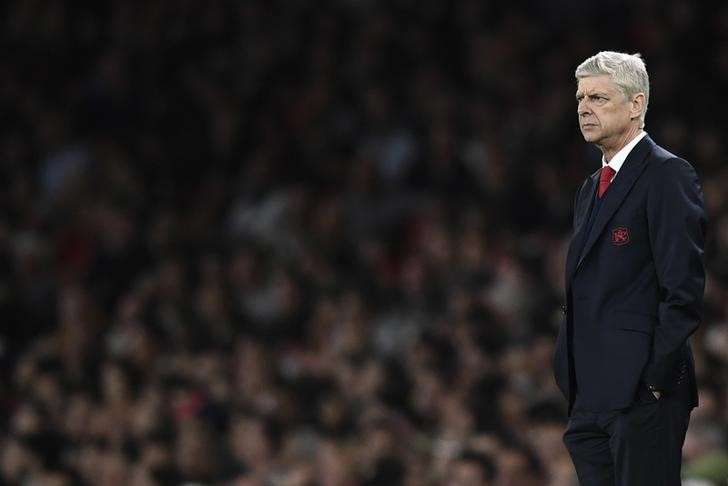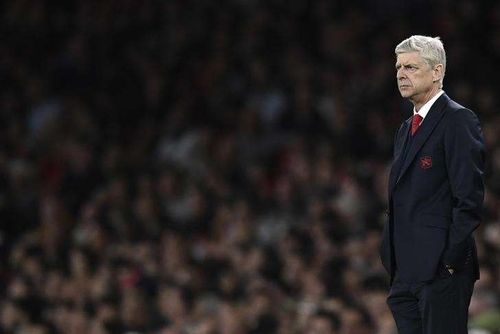
Wenger retains lofty vision as he reaches milestone

By Martyn Herman
LONDON (Reuters) - Arsenal manager Arsene Wenger, for all his admirable qualities, has faults. He is not gracious in defeat, he is as stubborn as a mule and he often suffers from selective vision, to name a few.
But as the charismatic Frenchman prepares to mark 20 years in charge of Arsenal at Burnley on Sunday it could be said his biggest fault is the ceaseless pursuit of silverware by playing fantasy football - a noble undertaking prone to failure.
That is why, despite giving so much to the English game since being met by headlines of "Arsene Who?" when he arrived in 1996, there are a few conspicuous spaces in the trophy cabinet.
It would be harsh to criticise the 66-year-old since he has won three English Premier League titles and six FA Cups as well as steering Arsenal within 14 minutes of beating Barcelona in the 2006 Champions League final.
Yet all but two of those feats were achieved before the north London club left the marble-halled splendour of their Highbury home for the Emirates Stadium 10 years ago.
It is true that the 60,000 fans who fill the gleaming new arena enjoy a brand of football that when it clicks, as it did when they tore FC Basel apart for 45 minutes in a 2-0 Champions League group victory on Wednesday, sets the pulse racing.
But since the stadium move, one that was supposed to elevate Arsenal to the status of European giants, back-to-back FA Cups in 2014 and 2015 are all Arsenal fans have had to celebrate.
The team have finished in the top four every year under Wenger but that consistency has become a stick with which to beat him - proof of the bloody-mindedness of the professorial Frenchman for whom the beautiful game means just that.
If the benchmark for Europe's elite is winning the Champions League, six consecutive last-16 defeats suggest that for all his teams' flowing football, Wenger's philosophy does not cut the mustard among the devotees of the pressing game.
FLAIR AND EXPERIENCE
That was not a problem in his early years, however.
When he took charge on Oct. 1 1996 all but one of the top-flight managers were British. He was a novelty but he hit the ground running.
He sanctioned the signing of Frenchman Patrick Vieira, who became the midfield linchpin in a succession of physically intimidating sides blessed with flair and experience.
Wenger had already inherited Dutch master Dennis Bergkamp and livewire striker Ian Wright.
But his real skill was teaching old dogs new tricks -- extending the careers of defensive cavaliers Tony Adams, Nigel Winterburn, Steve Bould and Lee Dixon.
"He had an amazing impact on the club," Winterburn told Reuters. "As soon as we trained you knew instantly that you were going to like his style of play.
"He made you feel that you were the best player in your position. He got us to express ourselves."
Off the field, Wenger was a trailblazer, replacing post-match beer and chocolate with science-driven diets and an emphasis on the importance of stretching.
"He was ahead of his time in terms of training style and diet, particularly how you looked after yourself," Winterburn said.
Adding Emmanuel Petit, a perfect foil for Vieira, winger Marc Overmars and striker Nicolas Anelka into the mix, Wenger's side won the league and FA Cup double in his first full season.
Over the next three campaigns they were runners-up in a ferocious battle for supremacy with Manchester United.
Another double arrived in 2001-02 before Wenger's 2003-04 Invincibles won the title without losing a game.
'BORING, BORING ARSENAL'
"I learned that you can achieve things that you think are not achievable," said Wenger, whose run of success eclipsed even that of their great manager Herbert Chapman in the 1930s.
Wenger turned Arsenal into the most watchable side in England and their supporters self-mockingly chanted "Boring, boring Arsenal" as the likes of Thierry Henry, who under Wenger became the club's record scorer, Bergkamp, Robert Pires and Freddie Ljungberg dazzled opposition defences.
Arsenal's loss to Barcelona in the Champions League final saw the break-up of the squad, though, with Bergkamp retiring, Pires leaving and Ashley Cole joining Chelsea, while Henry left for Barcelona in 2007 and won the European Cup in 2009.
As the big money swept into English football, Arsenal's purse strings tightened as paying off the debts incurred to build the stadium became a priority.
Wenger tried to counter the spending power of Chelsea and Manchester United, building a side around Cesc Fabregas and Robin van Persie, but silverware remained elusive.
The famine ended in 2014 when Arsenal beat Hull City in the FA Cup final and then defeated Aston Villa to retain the trophy.
But Wenger's contract is up at the end of this season and he is being tipped as England's next boss, although Winterburn says he has unfinished business at Arsenal.
"It's been sticky since 2006, but I know he's very driven still," said the former Arsenal fullback.
"There are some promising signs over the last few weeks. This time seems different."
(Reporting by Martyn Herman,; Editing by Neville Dalton)